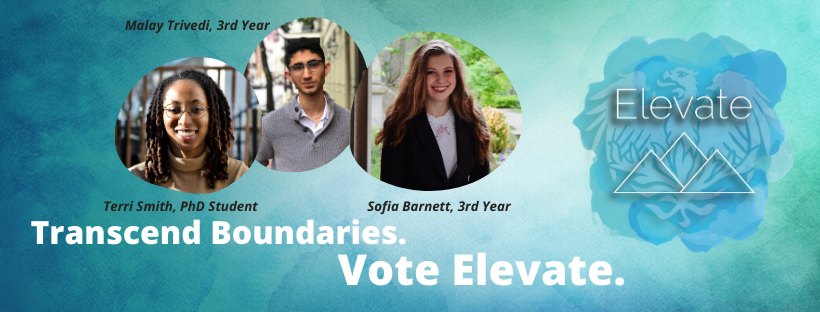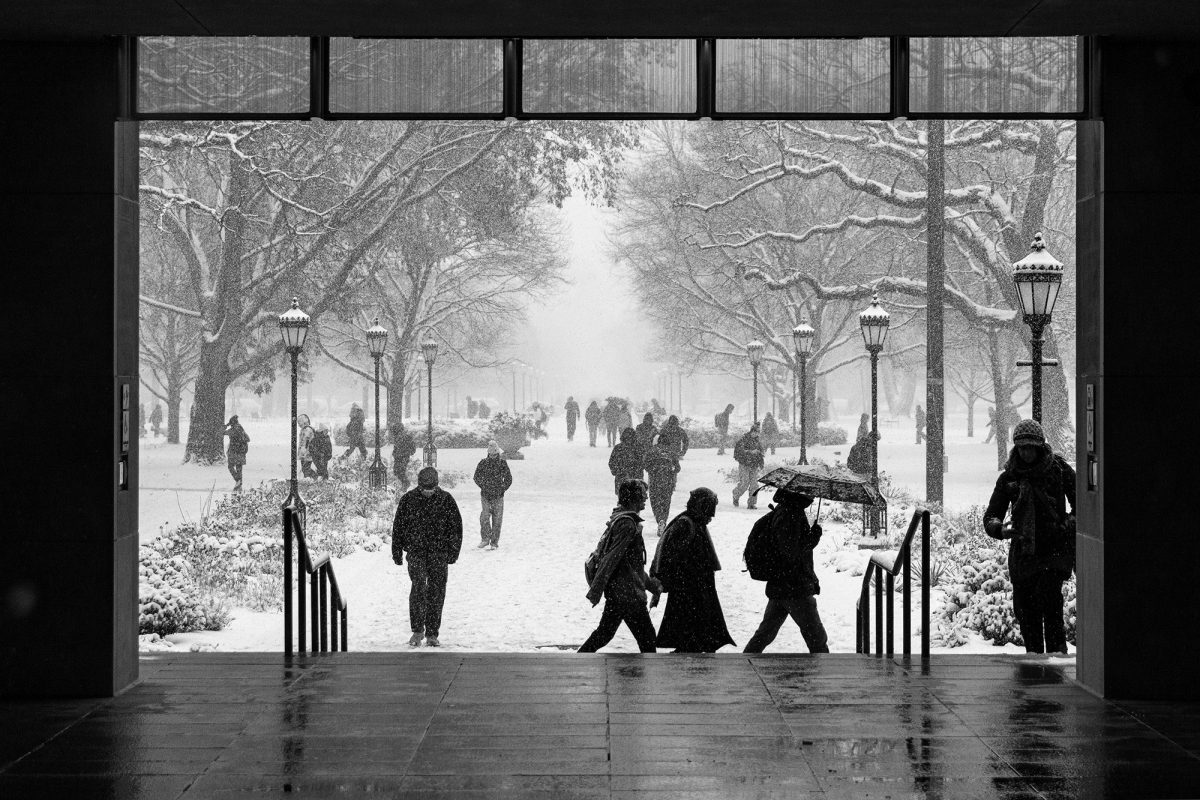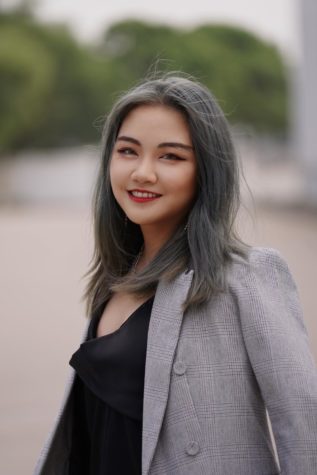The Elevate Slate comprises of third-year presidential candidate Malay Trivedi, third-year Vice President of Administration candidate Sofia Barnett, and Ph.D. student and Vice President of Student Affairs candidate Terri Smith. Trivedi served as the Student Body Vice President on the 2018–19 executive slate of Student Government. Barnett served as the parliamentarian on the 2018–19 Student Government.
The three candidates will run as a group, per Student Government (SG) protocol for executive slates.
On GSU
Elevate believes that they are uniquely suited to bridge the gaps between graduate and undergraduate students across the University, a problem that has not gained particular attention in the past.
Smith is the first graduate student to run for executive slate on Student Government in four years, and according to her, the representation is important to graduate students, who had been left out of conversations on campus before.
Elevate has been in conversation with many student groups, including GSU, about how they can further support them. Smith said that if elected, their main priority is to use their position to leverage direct conversations between GSU and administration.
“Because of the decentralized nature of the University, graduate students struggle to make connections with students outside of their division. We are committed to enhancing those cross-divisional interactions,” Smith said.
For example, Smith mentioned that they would like to support organizations like Diversity Advisory Board, who piloted the University’s first peer mentorship program for Ph.D. students. A key feature of the initiative was to match students with others from outside their division.
On Inclusivity
The slate plans to invest in developing memorials of Women of Color who have been foundational in the University’s history. Trivedi said that he has already been working on the project for Jewel Lafontant, the first black woman to graduate from UChicago Law School and the first female Deputy Solicitor General of the United States.
On top of contacting Lafontant’s family and having one-on-one meetings with University administration for the project, the slate also brought student groups into the conversation. “I have been working with the Black Law Students Association, and [I had] conversations with one of the law students there about how we can expand this work and bring this to the permanent structure at the law school,” Trivedi added.
Meanwhile, the slate is planning an outreach campaign to bring more marginalized student voices into leadership positions within the SG cabinet. “They’re going to be partners with us throughout pushing forward some truly progressive policies and really powerful work,” Trivedi explained.
In line with other Diversity and Inclusion initiatives, the slate also plans to inaugurate a Critical Race and Ethnic Studies Department (CRES). Smith is going to teach a class on black queer feminist practices through Center for the Study of Race, Politics, and Culture. She expressed her appreciation for student advocacy groups that work towards building a CRES Department, and said that their slate, if elected, would be in a position to leverage these conversations and support the efforts that are already in motion.
“This is something that has been talked about in the Student Government in the past,” Barnett added, “but we are going to address it in a new way, [as we have] the institutional knowledge that Terri has from building a class when we are looking into what is like a significant financial and administrative undertaking by the University. In order for them to do this, we need to have strong support and plans laid out, and so the best way to do this is to have everyone involved.”
On Accessibility
The slate plans to increase support for students with disabilities by surveying all University physical spaces for American with Disabilities Act compliance. During Trivedi’s time on the 2018–19 slate, he held the first Student Accessibility and Disability Advocacy Committee at UChicago. He found that the University was behind many peer institutions across the country when it came to making campus resources accessible to students with disabilities.
“What we hope to do now is reseat this committee as soon as possible, conduct that work, pushing forward, and publicize it,” Trivedi said, “for students who have disabilities but do not have the opportunity to get the right accessibility at this university—who have been failed by this university—[we] support them if they choose that they want to pursue litigation to reform the University.”
On Mental Health
Drawing from Trivedi’s own experience as a resident assistant and serving on the Student Health Advisory Board, he noted that the first thing the slate needs to do about mental health resources on campus is to sufficiently understand the processes and the offices that exist, including Student Health Service (SHS), Student Counseling Service (SCS), and the new Wellness Center.
“I think [this is] something that we bring in to an unparalleled level,” he said of his own experience with such affairs, including his effort in bringing more diverse counselors, “and second, being able to develop those relationships and really push on them, which is something that I've been doing for the last couple of years.”
The slate also plans to expand more mental health resources that are unique for graduate students. Graduate student experience had been constantly omitted during campus conversations, and their mental health needs are different from that of undergraduate students.
“Especially in light of COVID-19, graduate students are facing an entirely new host of issues. We have an increased sense of possible job insecurity. A lot of our research is literally put on halt. We are facing a time now where we are just uncertain about financial support,” Smith explained.
She emphasized that not only would Elevate expand available resources for graduate students, but they also have to expand the knowledge of the ones that currently exist, for many graduate students were unaware of the resources already available to them.
In response to the COVID-19 pandemic, SCS has expanded their service to 24 hours. Elevate also attempts to push for the extended hours of diverse counselors for students at different time zones.
On Financial Resources
The slate hopes to work with student advocacy groups and initiatives to increase the financial resources available for students amid the pandemic.
“The University has handled the financial aspect [of their COVID-19 responses] broadly reactionarily. It is often in response to measures put forth by the students,” Barnett said. “If the University is going to continue to be reactionary, I think it is the ultimate key role of student government to make sure that the facilitation of that and the reactions happen as quickly as possible.”
Trivedi pointed out that Student Government advocacy combined with grassroots activist advocacy could lead to policy change on campus. For example, student activism groups have managed to bring back the payment for Resident Assistants during spring quarter. Trivedi himself talked extensively with Housing and Residence Life staff, and the current SG Executive Slate also held meetings with Michele Rasmussen, Dean of Students in the University.
“There really is an ability for massive change to be able to happen. But that’s only if we bring in every single person who's advocating and fighting for these issues, make a concerted specific and focused effort towards that change,” Trivedi said.
Following their running theme of student activism, Elevate expressed their full support for student initiatives like UChicago for Fair Tuition. “We [will] touch base with them to see what more we can do to support them through our channels,” Trivedi said.
On RSO Finances
The slate plans to restructure annual allocations for RSOs and Gruaduate Student organizations (GSEUs) in light of COVID-19. Due to the current situation, RSOs and GSEUs are facing more pressure than usual to apply for SG funding, because the time is more constrained, and students no longer have the chance to go to SG office hours to ask for help with proposals.
“It will be critical for the elected slate in the very first few weeks, if not days, to make sure that there are clear and clarified resources. [They should] work very closely with the CLI [Center for Leadership and Involvement] to make sure that all RSOs and GSEUs are disseminated information on exactly what the application process looks like,” Barnett said.
Elevate plans to push back the annual allocation process and rely on the Student Government Finance Committee through the rest of the spring quarter for student groups to be funded continually.
The Slate also plans to expand the timeline for annual allocations and set new guidelines for funding committees next year. First, they would connect with CLI to make sure that they are clear about the current RSO finances. Second, they would connect with CARE because they set the budget for next year.
“We need to have [conversations] with CARE and try to find ways that we can work with them, because I know that they have really positive, progressive policy ideas, and they currently have a better understanding than any other slate running of what the state of RSOs and student government finances are,” Trivedi said.
To better facilitate the funding application process for student groups, Elevate hopes to create an outreach strategy for individualized support for each RSO, which they plan to draw from the current advising structure of CLI.
On Sexual Misconduct
Elevate plans to codify the Illinois Student Sexual Misconduct Conference as a permanent SG fixture. Trivedi started the conference during his term as Student Body Vice President, where he reached out to higher education institutions across Illinois for a one-day intensive conversation at UChicago.
Elevate hopes to rejoin the Chicago Coalition for Colleges and Universities (CCCU) and ask institutions to present at the conference through the coalition. “[This] would strengthen our reach across the state and allow us to learn best practices from other universities who are implementing really great programs and bring them here,” Trivedi explained.
Barnett added that the conference is a rallying point to connect all resources for sexual misconduct on campus, including SCS, SHS, and Title IX Office. Due to the lack of communications between these institutions, there is not enough conversation and support on campus.
On Safety
One key priority of Elevate is to enhance the transparency of UCPD with a broader cross-university campaign. Through rejoining CCCU, the slate hopes to bring back Illinois House Bill 3932, which was related to open information release of private police forces.
“Right now, the way that is structured is just UChicago students trying to appeal to the University,” Trivedi said. “If we’re able to get to a position where there is a combined coalition of seven or eight universities and all of the representative student populations who are going to state representatives…this is the kind of bill that we need to see passed.”
The slate pointed out certain aspects of UCPD that would have to be publicized, including the criteria for hiring offices, diversity training, trauma-informed training, and statistics on diversity within the police force.
They believe that making the information accessible is the first push to ensure student safety. Meanwhile, SG would help facilitate the conversation between student activists and UCPD, as well as elevate the voices of the south side community, in order to break down the stereotypes about South Side Chicago among many students.
“We need to be in conversation with groups who have a large presence on the South Side, such as Black Youth Project 100 (BYP100) or the #LetUsBreathe Collective,” Smith added. “This is not our area of expertise, but we have the ability to make connections with those who do have this area of expertise.”
On Communication With Administration
The slate envisions publicizing all meetings they have with the administration and including student voices before having these meetings.
“We want to make sure that all the minutes of meetings that are being taken are publicized on our Facebook page and our website,” Trivedi said, “but also right before we have these meetings, are we going out and seeking to find the types of student groups who will be most affected by that issue area, and asking them how can we ask questions rather tailored for you? On top of that, how can we use our position to make that space available to you?”
Elevate plans on going on listening tours to marginalized student groups as part of their plan to connect the student groups and the administration, giving them a space to ask questions and speak up for themselves.
On Greek Life
Regardless of the recognition status, Elevate wants to make sure that there are resources to support students in Greek life.
Barnett said that offices for sexual misconduct prevention were not familiar with situations within Greek life until recently. Therefore, the SG slate should work on keeping the offices informed and continually providing resources for those communities.
Trivedi added that his work of reaching out to fraternities and sororities and including them in the sexual misconduct conference has made phenomenal changes, so the slate hopes to continue that effort.
“The Student Advisory Board has really started to shift the way that administration thinks about Greek life. Within the last two to three years, we have started to move away from a place where they didn’t really want anything to do with Greek life to a place now where they are actually asking,” he said.









